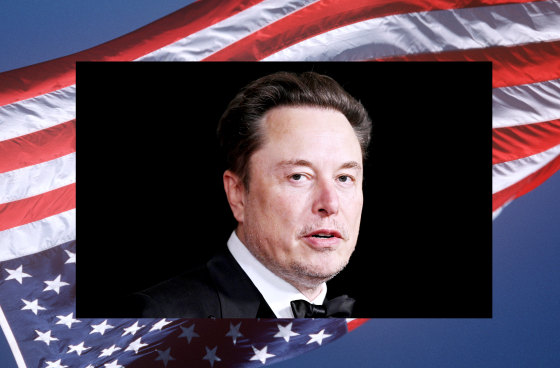Elon Musk, self-proclaimed “free speech absolutist,” is demanding the government infringe on free speech rights. Again.
Despite his posturing as a defender of free expression, Musk is one of the nation’s most vexatious litigants against anybody who exercises their First Amendment rights in a way he doesn’t like. His latest target is GARM, the Global Alliance for Responsible Media, an industry association of advertisers on online platforms of which X, formerly known as Twitter, is still a member. The lawsuit also targets several of GARM’s members for the supposed crime of declining to purchase ads on Musk’s website.
Major corporations generally do not want to pay for ads running next to posts praising Adolf Hitler.
X’s CEO, Linda Yaccarino, posted a video on Tuesday explaining that the suit is part of the company’s noble pursuit of preserving “the global town square … the one place that you can express yourself freely and openly.” Yaccarino wore a pendant around her neck that read “FREE SPEECH.”
On Thursday, GARM, citing its inability to handle legal fees that would likely run into the seven figures, simply shut its doors, ending all operations. Musk’s censorial bullying worked — abusing the legal system to shut down his critics.
Musk’s argument against GARM fits a long-running pattern for him: attacks on free speech wrapped in the rhetoric of defending free speech.
Major corporations generally do not want to pay for ads running next to posts praising Adolf Hitler, among other noxious content that has flourished on X under Musk’s ownership. It’s hardly an unreasonable position, and GARM worked to promulgate shared standards companies can adopt for this type of brand safety. This, Musk alleges, amounted to a violation of antitrust laws.
Deciding where to purchase ads is an exercise of core free speech and free association rights for any individual or organization. Boycotting X because it’s overrun with hate speech is no different from a conservative advocacy group declining to pay for ads on a progressive podcast. It’s also a case of business judgment for for-profit corporations. PetSmart might well choose to buy magazine ads in Cat Fancy rather than Cigar Aficionado, for example.
It’s the latest in a long line of Musk lawsuits seeking to silence his critics, a tactic known as a strategic lawsuit against public participation, or SLAPP.
He’s also sued Media Matters for documenting how X fails to keep ads from large corporations away from extremist content. In the same vein, he’s gone after the Center for Countering Digital Hate. He also endorsed the patently absurd criminal investigations into Media Matters launched by the Republican attorneys general of Texas and Missouri, already enjoined by a federal court as the obvious First Amendment violations they are.
It’s the latest in a long line of Musk lawsuits seeking to silence his critics, a tactic known as a strategic lawsuit against public participation, or SLAPP.
Sometimes Musk’s interest in promoting censorship extends beyond his own critics, such as when he agreed to pay the legal fees of a Canadian anti-vaxxer who had sued a wide range of people for being mean to her.
For many years, actual free speech advocates have been pushing for anti-SLAPP laws, which make it easier to promptly dismiss and receive legal fees for litigation targeting constitutionally protected speech. Texas and California among other states have adopted these robust protections. Unfortunately, there is no national anti-SLAPP law for lawsuits based on federal law claims, such as Musk’s antitrust theory. Federal circuit courts are also divided on whether state anti-SLAPP laws can apply even to state law claims, such as defamation, being heard in federal court under interstate diversity jurisdiction.
In the meantime, Musk’s anti-speech lawfare has its intended effect even when it could never plausibly reach a final decision in his favor.
In addition to shutting down GARM, Media Matters recently laid off several employees, too, with many observers pointing to Musk’s litigation as a likely contributor. This is the defining feature of SLAPP strategy: process as punishment, ruining targets with the expense of fighting a case even when it lacks any legal merit. The tactic can be particularly effective aimed at nonprofits and individuals, whose relatively modest budgets simply cannot handle a protracted court battle with one of the world’s richest men.
Beyond simply being a rich and powerful bully who can waste his own money on vexatious, performative litigation, Musk’s theory of “free speech” is a censorship wolf in sheep’s clothing. He and those he agrees with should be free to speak their minds, the thinking goes, but nobody else should be allowed to criticize or disassociate from them in response. If it falls under nebulous labels like “cancel culture” or the “woke mind virus,” your speech is actually bad for speech and so shouldn’t be allowed. It’s unabashedly statist in its eagerness to use and abuse government power to police the discourse.
Musk is free to run his own website however he wants, as he should be. But his claims to be a champion of free speech are a hypocritical farce. In reality, he is one of the biggest enemies of the First Amendment, and should be recognized as such.
